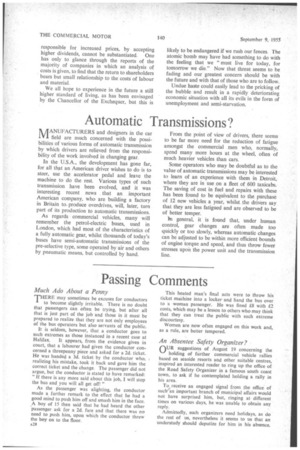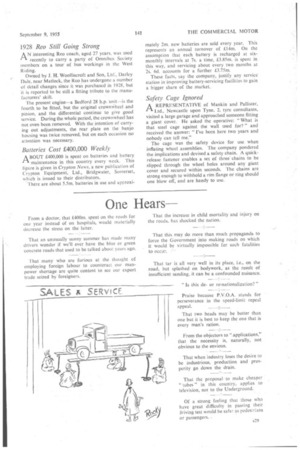Passing Comments
Page 30

Page 31

If you've noticed an error in this article please click here to report it so we can fix it.
Much Ado About a Penny
THERE may sometimes be excuses for conductors to become slightly irritable. There is no doubt that passengers can often be trying, but after all that is just part of the job and those in it must be prepared to realize that they are not only employees of the bus operators but also servants of the public. It is seldom, however, that a conductor goes to such extremes as those instanced in a recent case at
Halifax. It appears, from the evidence given in court, that a labourer had given the conductor concerned a threepenny piece and asked for a 2d. ticket. He was handed a 3d. ticket by the conductor who, : realizing his mistake, took it back and gave him the correct ticket and the change. The passenger did not argue, but the conductor is stated to have remarked: "If there is any more said about this job, I will stop the bus and you will all get off! "
As the passenger was alighting, the conductor made a further remark to the effect that he had a good mind to push him off and smash him in the face. _A boy of 15 then said that he had heard the other passenger ask for a 2d. fare and that there was no need to push him, upon which the conductor threw the boy on to the floor.
A28 This heated man's final acts were to throw his ticket machine into a locker and hand the bus over to a woman passenger. He was fined £8 with £2 costs, which may be a lesson to others who may think that they can treat the public with such extreme discourtesy.
Women are now often engaged on this work and, as a rule, are better tempered.
An Absentee Safety Organizer?
nUR suggestions of August 19 concerning the holding of further commercial vehicle rallies based on seaside resorts and other suitable centres, inspired an interested reader to ring up the office of the Road Safety Organizer in a famous south coast town, to ask if he contemplated holding a rally in his area.
To receive an engaged signal from the office of such an important branch of municipal affairs would not have surprised him, but, ringing at different times on various days, he was unable to obtain any reply.
Admittedly, such organizers need holidays, as do the rest of us, nevertheless it seems to us that an understudy should deputize for him in his absence.
1928 Reo Still Going Strong A N interesting Reo coach, aged 27 years, was used 1-1 recently to carry a party of Omnibus Society members on a tour of bus workings in the West Riding.
Owned by J. H. Woolliscroft and Son, Ltd., Darley Dale, near Matlock, the Reo has undergone a number of detail changes since it was purchased in 1928, but it is reported to be still a fitting tribute to the manufacturers' skill.
The present engine—a Bedford 28 h.p. unit—is the fourth to be fitted, but the original crownWheel and pinion, and the differential continue to give good service. During the whole period, the crownwheel has not even been removed. With the intention of carrying out adjustments, the rear plate on the banjo housing was twice removed, but on each occasion no attention was necessary.
Batteries Cost £400,000 Weekly ABOUT £400,000 is spent on batteries and battery maintenance in this country every week. This figure is given in Crypton News, a new publication of Cry pton Equipment, Ltd., Bridgwater, Somerset, which is issued to their distributors. There are about 5.5m. batteries in use and approxi
mately 2m. new batteries are sold every year. This represents an annual turnover of £14m, On the assumption that each battery is recharged at sixmonthly intervals at 7s. a time, £3.85m. is spent in this way, and servicing about every two months at 2s. 6d. accounts for a further £3.75m.
These facts, say the company, justify any service' station in improving battery-servicing facilities to gain a bigger share of the market.
Safety Cage Ignored
AREPRESENTATIVE of Mankin and Pallister, Ltd., Newcastle upon Tyne, 2, tyre consultants, visited a large garage and approached someone fitting a giant cover. He asked the operative: "What is that steel cage against the wall used for? " and received the answer: "I've been here two years and nobody can tell me."
The cage was the safety device for use when inflating wheel assemblies. The company pondered the implications and devised a safety chain. A quick
release fastener enables a set of three chains to be slipped through the wheel holes around any giant cover and secured within seconds. The chains are strong enough to withhold a rim flange or ring should one blow off, and are handy to use.




























































































